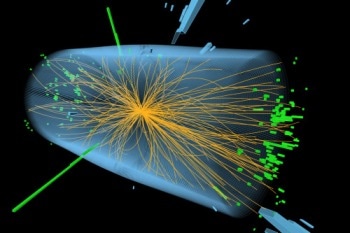May 27 2016
The hunt for Dark Matter taking place at the Large Hadron Collider in CERN has taken a great leap forward thanks to new detection technology developed by a team from the UK, including physicists from the University of Bristol.
 Graphic of a CMS collision event. Image credit: CMS/CERN
Graphic of a CMS collision event. Image credit: CMS/CERN
The system, installed on the CMS experiment, is being used for the first time anywhere in the world and the pioneering approach will enhance our understanding of the fundamental physics of the universe.
The five-year development, delivery and installation of the new general purpose detector in the CMS experiment at the LHC is thanks to the efforts of a team of researchers, scientists and engineers from the UK.
The upgraded general purpose CMS detector for the LHC pulls together all the data produced in the microsecond after each particle collision. The detector studies the data needed for understanding a wide range of physics including the properties of the Higgs boson, searching for extra dimensions and for the particles that could make up dark matter.
Dr Jim Brooke, Senior Research Associate in the School of Physics at the University of Bristol, who believes the new system is much more flexible than the previous detector, said: "The system effectively receives a digital image of each collision from the detector. This upgrade is like switching to HD TV, the pictures are much higher resolution. We can also process an entire image in one chip; before we had to split them up and process each piece separately.
"With the old system, we mostly relied on identifying one or two high energy particles as a sign of interesting physics. Seeing the whole picture in high resolution means the electronics can begin to decide whether those particles come from a Higgs boson or new physics like dark matter production. It's a really flexible, powerful system, and we’re only just starting to use its capabilities."
Data from the CMS detector must be analysed in less than a millionth of a second to decide whether something interesting has happened and that the data should be kept for further analysis.
Professor David Newbold, Head of the Fundamental Physics Research Group at the University of Bristol and UK spokesperson for the CMS experiment at CERN, said: "Although the CMS detector is huge, all of the collision data has to be immediately analysed by an electronic 'brain' the size of a microwave oven. The scientific results from the LHC depend crucially on selecting a tiny fraction of collisions for detailed analysis, and throwing away the rest. The new technology we are using in CMS is going to increase our chances of spotting Dark Matter and other new particles in the high energy collisions in 2016 - it's like turbocharging our detector."
Dr Alex Tapper from Imperial College London leads the group that was involved in developing the custom electronics boards for the new trigger, added: "Normal PCs are just not fast enough to perform this analysis of the data so we developed a custom processor ourselves. We used a cutting edge chip which is very good at performing many calculations in parallel and built a system using optical fibres to feed enormous amounts of data into the chip. The new system is much more powerful and we hope it will help us make new discoveries in the future."